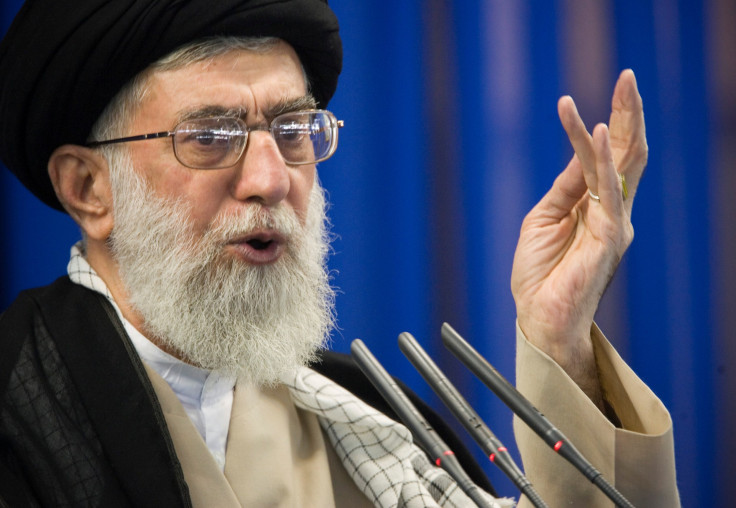Iran’s Supreme Leader Slams ‘Big Enemies’ US And UK, Rules Out Cooperation On Regional Issues

“We have many small and big enemies, but foremost among them are America and this very evil Britain,” Ayatollah Ali Khamenei said in a televised speech Friday.
In another sign that the historic nuclear deal can only go so far in rebuilding ties frayed by decades of mistrust, Iran’s Supreme Leader Ayatollah Ali Khamenei slammed the U.S. and the “evil” U.K., calling them his country’s main enemies. In a speech marking the 27th anniversary of the death of Ayatollah Ruhollah Khomeini — the founder of Iran’s Islamic Republic — Khamenei also ruled out cooperation with the U.S. on regional issues.
“We have many small and big enemies, but foremost among them are America and this very evil Britain. America has continued its enmity toward Iran since [the 1979] revolution. ... It is a huge mistake to trust evil Britain and the Great Satan [the United States],” Khamenei, known for his vitriol-laced speeches deriding the West, said Friday.
Nuclear talks experience shows even if we compromise, US won’t stop its destructive role. Iran fulfilled its obligations but US is disloyal.
— Khamenei.ir (@ khamenei _ir) June 3, 2016
“We will not cooperate with America over the regional crisis. Their aims in the region are 180 degrees opposed to Iran’s,” he added, in an apparent reference to the ongoing conflicts in Syria and Iraq.
In Syria, the multipronged conflict has pitted the U.S. and rebel groups backed by it against militants of the Islamic State group and President Bashar Assad , who has the support of Russia and Iran — two countries have consistently balked at the prospect of Assad’s removal, stating that doing so would create a power vacuum that may plunge the war-torn country into further chaos.
“If we remain strong and united and revolutionary, those who are trying to bully Iran and are against us will not succeed,” Khamenei said. “Wherever our movement was revolutionary, we succeeded but when we ignored [the revolution], we fell behind. If you change the course, Islam and the revolution will be slapped in the face.”
In recent months, since the landmark deal between Iran and six world powers saw some of the crippling economic sanctions against Iran being lifted, many in the Shiite nation have voiced concerns that the U.S. is not doing enough to fulfill its end of the bargain. Even now, banks in the U.S. are prohibited from doing business with Iran and foreign lenders remain barred from carrying out dollar-based transactions with the country through American banks.
As a result, even as Iran's President Hassan Rouhani — widely perceived as a moderate — leads an effort to thaw ties with the West, his critics have begun attacking not only the nuclear deal, but also his economic agenda and social reform overtures.
"Those who say the future is in negotiations, not in missiles, are either ignorant or traitors," Khamenei said in March, defending Iran's ballistic missile tests that the U.S. says violated the terms of the nuclear deal. "If the Islamic Republic seeks negotiations but has no defensive power, it would have to back down against threats from any weak country."
© Copyright IBTimes 2024. All rights reserved.












